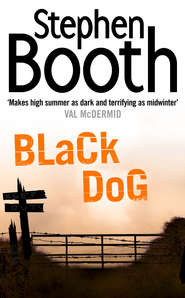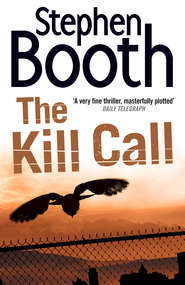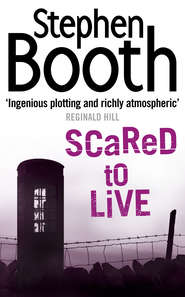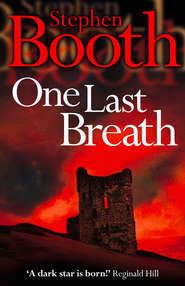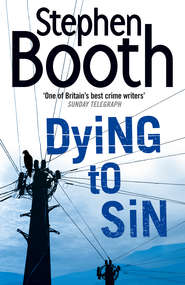По всем вопросам обращайтесь на: info@litportal.ru
(©) 2003-2024.
✖
Lost River
Автор
Год написания книги
2019
Настройки чтения
Размер шрифта
Высота строк
Поля
Dawn wiped her eyes and looked briefly at Cooper. He read everything in that fleeting glance. While she might tell her husband he was right, those were no more than the words that came automatically from her mouth. What was happening inside her head was a whole world away. He knew she would never stop tormenting herself, could never rid herself of the endless ‘what ifs’. That list of possibilities would run through her mind in a constant loop, the moments when history might have been changed, playing over and over again like scenes from a film she had never actually watched. For the rest of her life, she would still be asking herself: What if?
The drive back to Ashbourne on the A52 took only twenty minutes. Cooper was glad it wasn’t a longer journey. The atmosphere in the car became uncomfortable as the Nields fell silent, each of them absorbed in their own thoughts. He’d tried to fill in some of the silences himself, but there was a limit to how much you could say in these circumstances without starting to sound ridiculous and insincere.
Ashbourne was a town built mostly of red brick, which made it look totally different from the limestone and millstone grit of Edendale to the north. This was clay country, softer than the White Peak, less forbidding than the bleak moorlands of the Dark Peak.
At school, in Geography lessons, Cooper had learned the significance of the boundary of Red Triassic rock which ran from Ashbourne to Thorpe, leaving the limestone gorge of Dovedale in startling contrast on the other side.
Perhaps it was all that red brick, but somehow the town felt unfamiliar to Cooper, as if he had already left his comfort zone. The Pennine hills were in his blood, and nothing could replace them. If he were ever to move, even the few miles to Ashbourne, it wouldn’t feel like home.
As he drove into the town, Cooper could see the last stages of construction work taking place on Clifton Road, where a new hospital was due to open next year. He wondered if it would have its own A&E department, whether it would have made any difference if Emily had got to hospital a few minutes quicker.
But he recalled the body he’d held in his arms, the futile attempts to resuscitate her on the riverbank. Surely she had already been dead when she came out of the water?
The boy was very quiet. At least the mother had let some of it out in that burst of emotion. But Alex was dumb. He was a slim youth, a bit under-sized for thirteen perhaps. He had dark hair like his father’s, but allowed to grow long, so that it fell over his face. His mother occasionally tried to push it back into position, and each time the boy flinched away from her. Alex had dark eyes, too, that gazed into Cooper’s every time he looked in his rear-view mirror.
Shock took people in different ways, of course. It was slightly disturbing, though, the way the boy kept looking at him and saying nothing. It was as if he was trying to weigh up Cooper’s trustworthiness, wondering whether he could share some secret with him. It was highly likely that he found it impossible to talk to either of his parents at that age. What thirteen-year-old could? A stranger to talk to might be exactly what he needed.
But how did you communicate to a thirteen-year-old boy that he was welcome to talk if he wanted to? Probably you didn’t. Teenagers were like animals, weren’t they? You had to wait until they came to you.
The Nields lived on the Shires Estate, off Wyaston Road. Executive homes with a view of the countryside where the road turned into a steep hill before curving to a dead end just short of the A52. At the bottom, children were playing football in the road. You didn’t see that too often.
The Nields’ house looked to be ten or twelve years old, with carriage lamps and hanging baskets, an oriel bay window and two half-timbered gables. It was set back from the road behind a neatly trimmed beech hedge, and a paved driveway led up to a double garage.
A house like this was usually described in estate agents’ adverts as a period-style detached residence. Cooper turned and looked at the view beyond the end of the close – Peak District hills on the horizon, including the distinctive pyramid shape of Thorpe Cloud. A detached residence in a much sought-after area, then. Lucky Nields.
He dropped Dawn and Alex off at the house, reassured to see a member of the family waiting anxiously for them on the drive. Nield explained that it was his wife’s sister, come up from Derby to be with her.
‘Thank you,’ said Nield, when Cooper returned him to the car park in Dovedale. ‘I don’t know how to thank you enough.’
‘There’s really no need, sir.’
Cooper watched Nield drive away in his silver VW Passat.
The car park was almost empty now, and access to the dale itself sealed off by police tape. Beyond the tape, Cooper could see Sergeant Wragg’s yellow high-vis jacket down by the river. But he felt reluctant to go near the water. The thought of its noise and icy coldness made him shiver. The image of water foaming over a weir caused his skin to crawl with apprehension.
Shading his eyes with his hands, Cooper gazed into the distance for the furthest glimpse of water he could get before a curve in the dale hid the Dove from view. He knew that the river rose way in the north, on the slopes of Axe Edge, close to the Leek to Buxton road. It ran roughly southwards for forty-five miles to join the Trent. For much of its course, it ran with one bank in Derbyshire and the other in Staffordshire. Which meant, strictly speaking, that his jurisdiction as an officer of Derbyshire Constabulary ended in the middle of the water, about halfway across the stepping stones.
He pictured the Dove widening as it reached Hollinsclough and flowed beneath the reef knolls of Hollins Hill, Crome Hill, Parkhouse and Hitter into the tourist village of Harrington. It was after Hartington that the valley became a gorge, the meadows ending abruptly at Beresford Dale. Wolfscote Dale, Mill Dale, and then the northern entrance into Dovedale itself, where more than a million visitors a year came to admire the wooded slopes and white limestone rocks carved by nature into towers, caves and spires.
South of here, the Dove was joined by the River Manifold before flowing through the lowlands of Southern Derbyshire on its way to the Trent at Newton Solney.
Past those stepping stones, on a curve of the river, was a series of rocky outcrops, all with picturesque names. Dovedale Castle, the Twelve Apostles, Lovers’ Leap. They were picked out on maps and photographed by tourists as they strolled along the banks of the river in the summer. Pickering Tor, Tissington Spires, the Rocky Bunster. One of the most prominent features was a natural arch on the eastern side of the dale. For some reason, whoever had named these rocks had suffered an imagination failure at this point. According to the Ordnance Survey map, this was called simply the Natural Arch. A bit disappointing, really. You would have expected the Devil’s Bow or the Mouth of Hell.
Cooper tried to sort out his memories, to clarify what he’d seen in Dovedale, and what he hadn’t. But no matter how hard he tried, he couldn’t get an image of Robert Nield out of his head, hands raised, water dripping from his fingers.
But the image only flashed across his memory. With it came another, much stronger recollection. The feel of a cold, limp body. Not yet stiff, but icy. The coldness of the freshly dead.
Above the weirs, the river looked too shallow for anyone to drown in. Anyone but a small child, anyway. Downstream, the water was deeper between the weirs. The current formed deceptive pools. How had the Nields managed to choose a stretch of river where the water was that bit deeper, the crowds were sparser, and everyone seemed to be looking the other way?
But that was the way it went with these things. A combination of circumstances that no one could have predicted, and this was the outcome.
Cooper started the Toyota and turned north towards Edendale. He found he wasn’t even convincing himself. A combination of circumstances? Or was it something more?
The cold eating into his bones could not be explained by the weather.
4 (#ulink_9c72c4c9-178e-503a-96fd-21eb85b91929)
And how do you feel about it now? It was a question Diane Fry expected to be asked at any moment. It was, after all, a question that she’d asked herself many times, trying to analyse her own feelings, to make an inventory of the emotions as they welled up inside her. Pain, fear, horror. An awful sense of loss. And some other emotions so deep and nameless that they didn’t fit into any inventory. It didn’t matter what questions they asked her. No neat list would contain those feelings, no analysis could pin them down.
She recalled that rainy Monday morning in March, when she’d found Detective Inspector Gareth Blake standing in her boss’s office at E Division headquarters in Edendale. She hadn’t recognized him at first, as she automatically held out her hand, seeing a man who wasn’t much above her own age, his hair just starting to recede a little from his forehead, grey eyes observing her sharply from behind tiny, frameless glasses.
‘Diane,’ he said.
And then she’d remembered him. It was the voice that did it. She and Blake had worked together years ago, on the same uniformed shift in the West Midlands. But he’d been ambitious and got himself noticed, earning an early promotion. He was more mature now, better dressed, with a sharper hairstyle. The reek of ambition still hung in the air around him, though.
So what was Blake’s specialty now?
Cold case rape enquiries. Well, of course.
And then there had been Rachel Murchison, smartly dressed in a black suit and a white blouse, dark hair tied neatly back, businesslike and self-confident, but with a guarded watchfulness. A specialist counsellor, there to judge her psychological state.
Some of the phrases leapt out at her from the conversation that had followed.
‘Obviously, we don’t want to put any pressure on you, Diane.’
That was Blake, pouring a meaningless noise in her ear.
‘It’s understandable that you feel a need to be in control. Perfectly normal, in the circumstances.’
Murchison’s contribution. Well, Fry hadn’t wanted this woman telling her whether she was behaving normally or not. She didn’t want to hear it from anyone else, for that matter.
Just the sound of her name from Blake’s lips had brought back the memories she’d been trying to suppress, but which would now forever bubble up in her mind. She remembered how both of them, Blake and Murchison, had watched her carefully, trying to assess her reaction.
In the days that followed, others had seemed to be watching her in that some careful manner. But they could never comprehend the painful attempt to balance two powerful urges. The need to keep her most terrible memories safely buried now had to be set against this urge she’d suddenly discovered growing inside – the burning desire for vengeance and justice. No one could understand that. Not even Ben Cooper.
DC Ben Cooper had already been the darling of E Division when she arrived in Derbyshire. She’d been told how wonderful he was, what areas he was the expert in, the heights of knowledge he’d attained that no one else could possibly aspire to. She’d heard his name mentioned so many times before she actually met him that she’d already formed a picture of this Mister Perfect, the detective everyone loved, the man most likely to stand in her way. The picture that entered her mind was of a six-foot male with broad shoulders and perfect teeth, smiling complacently.
When he entered the CID room that first day back from leave, he could only have lived up to expectations if he’d been walking on water, or floating in a golden glow and trailing a string of haloes from his angelic backside. DC Ben Cooper had been set up for her to despise from the outset. No one liked a goody-goody.
But things had changed since then. Fry knew better than anyone that he was no Mister Perfect.
For years, her instinct had been to concentrate totally on her work. And that was a familiar story. She was no different from all the washed-up people everywhere, all the fools who’d ever messed up their lives or destroyed their relationships. Work was safe ground, a place where personal feelings could be put aside, shrugged off with her coat at the door of the office. The trouble was, right now she could feel the safe ground shifting under her feet. She was still as dedicated to the job as she’d ever been. But she had a suspicion the job wasn’t quite so loyal to her any more.
Fry was waiting to be called into Superintendent Branagh’s office, back at E Division headquarters in West Street, Edendale. She felt like a naughty school girl sent to see the headmistress.
‘Michael Lowndes,’ said Branagh, when she was finally summoned. ‘What went wrong?’
There was no point in trying to make excuses. Branagh had eyes that could look right through you.






